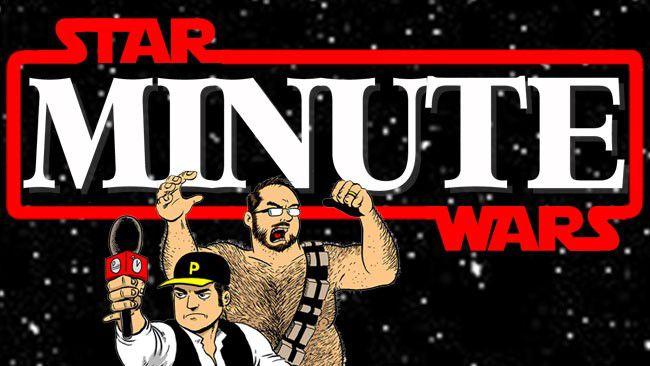The Microculture Is Coming
‘Star Wars Minute’ and its “movies by minute” podcast progeny are turning hardcore fandom into a new media niche, slicing up popular properties more finely than ever before to capitalize on our growing desire to never be bored"There is too much content."
So said someone on Facebook last Friday who’d just discovered Star Wars Minute, the podcast created by Pete "The Retailer" Bonavita and Alex Robinson. "I haven’t heard the podcasts but this sounds like it would kill the movie for me," another commenter said in the same thread.
Bonavita understands the skepticism. "It’s a fine line between added enjoyment and ruining it," he told me on the phone.
Bonavita, now 41, and Robinson, now 47, started Star Wars Minute in June 2013. Inspired by Mission Log, a Star Trek podcast committed to discussing all 726 (and counting) episodes of Star Trek’s several TV series, the two friends and New Yorkers decided to do a podcast devoted to their own sci-fi first love, Star Wars. But for the more movie-centric structure of the Star Wars franchise, the Mission Log model wouldn’t work.

"At the time there were only six [movies], so we were like, ‘Well, that’s only six episodes,’" Bonavita says. "Well, what if we broke it down? Then eventually, somehow it turned into minute by minute. I asked a couple of people, like, ‘Is this a good idea? Or is this a crazy idea?’ The answer most people gave me was ‘Both.’"
That was enough to boldly go where, as far as they knew, no podcaster had gone before: one podcast episode per minute of movie, with a new episode posted every weekday. Almost 600 episodes (and almost 600 Star Wars movie minutes, spanning five films) later, the two friends are still podcasting about Star Wars, and all signs point toward "good idea." Not only has Star Wars Minute developed a large listenership and an active community and yielded a sizable monthly paycheck for its hosts, but it’s also served as the seed of a rapidly expanding podcasting genre that might once have struck some (such as the aforementioned Facebook commenters) as too hyperfocused to thrive.

Star Wars Minute and the "movies by minute" movement it’s spawned have emerged from the media fire hose that’s nearly eliminated any need to be bored. They belong to a lineage with ties to pre-internet fandom, but access to high-speed internet, virtually unlimited storage space, and increasing control over our leisure activities have altered the deal. Star Wars Minute and its ultraspecialized podcast copycats might look like overkill, but the creators are hoping that the more minutely each of us carves up the culture, the hungrier we’ll grow for the small slices that are still on our plates.

In the beginning — before Star Wars Minute, unbeknown to Bonavita — there was Gutterballs, a minute-by-minute breakdown of The Big Lebowski hosted by Adam Welch and Brad Kozlek. As Welch explained to me in an email laced with "Lebowskese," the two friends from Penn State resolved in early 2012 to collaborate on some sort of podcasting project. "We asked ourselves, ‘What do we know about, and enjoy?’" Welch remembers. "We both love movies, and had taken film classes together back in college in the ’90s, and had even made movies together. So talking about movies seemed to make sense."
That was a start, but it wasn’t specific enough. "We didn’t want it to be a generic ‘talking about movies’ podcast," Welch says. "Even five years ago, the podcast market seemed saturated with that kind of show. I mentioned that maybe we could just talk about one movie. Pretty sure Brad suggested The Big Lebowski, and I, always the contrarian, said something like, ‘Yeah, but how can we talk about the same movie over and over again?’ So, Brad suggested splitting the movie up into minute-long pieces. The idea seemed so outlandish and absurd, and would require us to go so deep into the minutiae, it would be almost like internet performance art. I loved it immediately."
Gutterballs, whose hosts took four and a half years to finish discussing the movie via episodes that sometimes topped two hours, debuted 10 months before Star Wars Minute, but it didn’t have the same exposure; Welch says he and Kozlek actually considered doing Star Wars but opted against it because its fans are so "mainstream" and "rabid." Bonavita says he wasn’t aware that Gutterballs existed until he and Robinson were a year or so into Star Wars Minute, which they’d started without any delusions of grandeur. Bonavita, who’s now a digital media manager for a magazine, was once a buyer for Forbidden Planet (hence his "The Retailer" moniker), which is how he encountered (and eventually befriended) Robinson, an artist and award-winning writer of graphic novels. "Over time, we realized the more we hung out the more we talked about Star Wars," Bonavita says. Adding microphones to the mix wasn’t much of an adjustment.

The first time they tried talking about one minute of Star Wars, solely as an experiment for a previous podcast, they failed to record the conversation, which produced an inadvertent epiphany. "Alex called me up and we immediately did another one that was mostly different material, and were just like, ‘Wow, we just talked for pretty much two hours straight about Star Wars and a bunch of different things,’" Bonavita says. "There’s enough material in there."
At first, the two didn’t take the exercise very seriously; the first episode lasted only 11 minutes, about a third as long as they tend to now. "Originally it was just like, oh, we’ll do this for fun, we’ll have our friends on and we’ll see what we can do," Bonavita says. Then word started to spread, bolstered by an A.V. Club mention less than two months into the show’s run. When the duo reached the end of Episode IV, they decided it made sense to start The Empire Strikes Back, and when they wrapped up Empire, they felt compelled to complete the trilogy. (Leaving Han in hibernation would have been cruel.) By then, the podcast was self-sustaining: There was merch and a Patreon page, where today roughly 500 donors pledge a combined sum of more than $5,000 per month to reward Bonavita and Robinson for keeping the podcast alive (and to receive their own rewards, in the form of Patreon-only episodes).
When Disney announced its "new movie a year" plan for the franchise, Star Wars Minute’s cohosts realized that their own personal Star Tour might never need to end. "If they’re going to keep making movies for the rest of time, I guess we have this locked in," Bonavita says. With some trepidation, the podcasters plunged into the prequels, starting with The Phantom Menace, which they refer to as "The Naboo Movie" in one of the show’s many recurring references and inside jokes. And yes, that last link points to an in-depth Star Wars Minute wiki, where fans have diligently documented a series about diligently documenting a series.

Bonavita says that Star Wars Minute’s new and old episodes now combine for more than 100,000 listens per week, and the show’s resonance in the Star Wars community is such that Bonavita’s nickname inspired a canonical character. As news of Star Wars Minute spread, other aspiring hosts began to get in touch about borrowing the format for non–Star Wars movies. Bonavita considers the structure "open source," and he asks only for "the occasional shout-out." He doesn’t try to discourage people from picking any particular movie — early imitators ranged from classics such as Goodfellas to anti-classics including A Talking Cat!?!. But he does have two quasi-rules: If you start, you have to finish, and you shouldn’t start unless it’s a labor of love.

"I think somebody once said, ‘Hey, nobody’s doing Blade Runner, so we figure we should do Blade Runner, right? Like, I’m not that big of a fan, but it’s gotta be done,’" Bonavita says. "If you’re not that big of a fan, I don’t think you’re the right person to do it."
To stave off the unending inquiries about what was and wasn’t claimed, Bonavita bought the domain moviesbyminutes.com, where he collects the "by minute" podcasts he’s heard of. (Another "movies by minute" podcast creator is working on a directory dubbed "IMxMDB.") Bonavita’s tally has topped two dozen, with more movies being claimed, and podcasts being birthed, all the time. (Right after I talked to Bonavita, someone started The Princess Bride Minute.) "Tom [Taylor] from Indiana Jones Minute likes to joke that I’m the dad of the movie-minutes podcasts," Bonavita says.
Taylor’s story sounds typical of a "movies by minute" creator. He discovered Star Wars Minute through the A.V. Club notice and quickly caught up on the back catalog. After hearing Bonavita and Robinson urge others to try their own "movies by minute" podcasts in a 2015 episode for Star Wars Minute Patreon supporters, Taylor got in touch with two sets of friends and semi-seriously suggested to each that they get in on the action. To his surprise, both groups said yes, which led to Taylor starting Indiana Jones Minute and Caddyshack Minute last year with separate cohost crews.
Bonavita and Robinson, whom Taylor describes as "fantastically supportive," have appeared on Indiana Jones Minute to talk about Raiders of the Lost Ark. The community’s collaborative ethos is evident in the Facebook group for "movies by minute" creators, where hosts talk technique and production and arrange to promote and appear on each other’s shows. "Being part of this large, weird community of obsessive geniuses is gratifying every single day," Taylor says.
The strictures of the "minute" format create unusual challenges for the hosts: characters cut off in the middle of lines, uncertainty about how much to mention the events of other minutes and, worst of all, painfully slow sequences. Every creator has a horror story: "having to talk about the clock tower sequence for the third time in the first week of Back to the Future Part III," says Scott Carelli of Back to the Future Minute. Gary Roby Jr. of Harry Potter Minute is dreading "an upcoming stretch that’s just Hogwarts corridors." And Robinson remembers the slowest stretch for Star Wars Minute as the podracing scenes from Phantom Menace: "two weeks — 10 episodes — of nothing but CGI monsters racing around in a circle, with almost no dialogue. These are the times you’re very grateful to have a good guest commentator."
For most of the "movie by minute" hosts, who haven’t hosted long enough (or chosen a sufficiently prominent property) to profit financially from their work, the hidden material mined during their incredibly close reading of a lifelong favorite is its own reward. Pete Mummert, another host of Indiana Jones Minute, says, "There’s a quote by Gustave Flaubert I kept thinking of as we progressed through our first season: ‘[Anything becomes interesting if you] look at it long enough.’ I was constantly amazed that every single minute had so many amazing details and fun things to talk about."

Bonavita says that once he’s discovered a Star Wars secret — such as Harry Shearer’s uncredited voice work in Episode IV — he can’t unlearn what he has learned, which colors every future viewing. But he’s also aware that he and Robinson (and their guest hosts) still miss elements lurking within clips they’ve watched countless times. "As deep as we go, there are still people who are like, ‘Oh, you guys didn’t talk about my favorite part,’ which somehow got skipped in us talking for a half hour about 60 seconds of a movie."
Bonavita and Robinson are well-schooled in Star Wars, and they bring a level of scholarship to their podcast preparation, drawing on Wookieepedia deep dives in addition to printed reference works and even primary sources such as early versions of scripts. Bonavita went to school for film history and criticism, although that training doesn’t surface very often in episodes. "We’re not talking about color theory or what lens they use," he says. "We’ve had people kind of try out the show and say … ‘I was expecting that it would be about the making of it.’ They wanted us to get more into the nitty-gritty technical analysis of it. There’s plenty of room for that, we’ll dabble in it a little bit when it comes up, but our focus is more on — I would almost want to call it riffing, but it’s almost just having fun with it, picking it apart and looking at all the pieces rather than … passing judgment on it."

For all the irreverent theories Bonavita and Robinson delight in disseminating — Obi-Wan killed Uncle Owen and Aunt Beru; Jedi go commando under their robes; the Force doesn’t actually exist — the hosts aspire to a slightly more sedate kind of credibility. Bonavita, for instance, shies away from referring to Star Wars Minute as a "Star Wars podcast," instead describing it as "a show where we break down every minute of Star Wars," which he hopes sounds "a little bit more critical," not unlike Roger Ebert’s practice of examining movies frame by frame at his film-festival seminars. It’s a self-definitional line Bonavita struggles to straddle even within the same sentence: "Not to say that we’re respectable film critics, but it makes sound more like we’re analyzing it rather than just kind of gushing fandom — which, obviously, we do some of that too."
Star Wars Minute and its podcast progeny blur the traditional distinction between fans and critics/experts in a way that’s become much more common in the internet age. It might not be new for each of us to be an uncommon enthusiast about something — many of the "minute makers" I surveyed said that before they started their podcasts, they found other outlets to pursue the same passions: talking to friends and family, frequenting message boards and blogs, collecting and quoting. But it’s easier than ever to access enough information to develop (or convincingly impersonate) expertise, and it’s also easier than ever for us to reach others who understand and speak what Bonavita calls the "shared language" of our particular fandom, a comforting patois picked up through countless movie or TV viewings during our formative years. As Nick Rushton, a representative member of the "Star Wars Minute Listener’s Society," responded to my question about what drew him to the show, "I don’t have anybody in my ‘real life’ that is nearly as into Star Wars as I am … so it is genuinely comforting to know that I can listen to a new episode and then come to the SWMLS and geek out with like-minded people and not feel like any reference is ‘too obscure.’"

Before the era of iTunes and smartphones, one might have had to be fluent in a greater array of cultural languages to earn a place at a platform with the reach of Star Wars Minute. Today, finding time to talk is the most serious obstacle; if you create it and find a fertile niche, the audience it deserves will come. With one query, we can drill ever-more-deeply into our preexisting interests and ideologies, which enables all consumers to subsist on diets of things they already like and believe. As Listener’s Society member Christopher Dennis Di Guardia says, "I like how it’s one level deeper. Like your casual Star Wars superfan knows "TK-421," but your Star Wars Minute level has the fan knowing the name of the guy who says that," (RIP Peter Sumner).
Kowtowing to our own inclinations can have serious side effects (political polarization, fake news), but the bright side is that we’re never not stimulated. Bonavita believes the podcast form he helped popularize is "an extension or evolution of the way that we have been digesting movies and pop culture in general." And he’s even extended it beyond movies by hosting (with Robinson and others) AlphaBeatical, a show that devoted an episode to every Beatles song and planted another podcast tree whose branches include Ramones of the Day, The "Weird Al"phabet, Bruce Springsteen Sings the Alphabet, and From A to Ziggy. The premise works for books, too; Yer a Wizard Harry analyzes the Harry Potter series one chapter at a time.
Of course, most of the "movies by minute" podcasts, which target much smaller fan bases, are niche by definition and design, with Patreon pledges that merely cover their equipment and hosting costs (if they’re lucky). Bonavita says that he and Robinson have talked about trying to unite all of the shows on one network, but those discussions have stalled because their own show is self-sufficient. In addition to their Patreon revenue, they’ve also partnered with Wondery, a network that does dynamic ad insertion on all of the episodes downloaded on a given day, regardless of when they were published. That allows Star Wars Minute to monetize its archives. Much like Netflix and other streaming services stockpile original programming to seduce subscribers, it’s not hard to imagine a supplementary service of accompanying podcasts with commentary that caters to people who want more of what they consumed — not so much a second-screen experience as a post-screen experience. That sense of a dam about to break led to creators calling dibs on future shows, registering domain names, and speculating that squatters are snapping up domains they never plan to use.
"The way that our show is set up, and all these ‘movie minute’ shows, the back catalog is somewhat evergreen," Bonavita says. "Somebody will go find the show and will go binge all the previous seasons or all the previous episodes, at least. That kind of fits well with the current way that we consume media."
We’ve reached the point where there’s a podcast about almost everything, which means that if someone wants to talk about a popular property, they have to do something to set their podcast apart — be better, or find a different format. "Movies by minute" is a savvy response to podcast saturation that satisfies our craving for diversion. Even the skeptic from Facebook who complained about "too much content" came around when someone mentioned his weakness, The Simpsons. Unfortunately for him, there’s already a podcast about each Simpsons episode. Wait — as of late 2016, make that multiple podcasts. But Simpsons Minute is still unclaimed.


